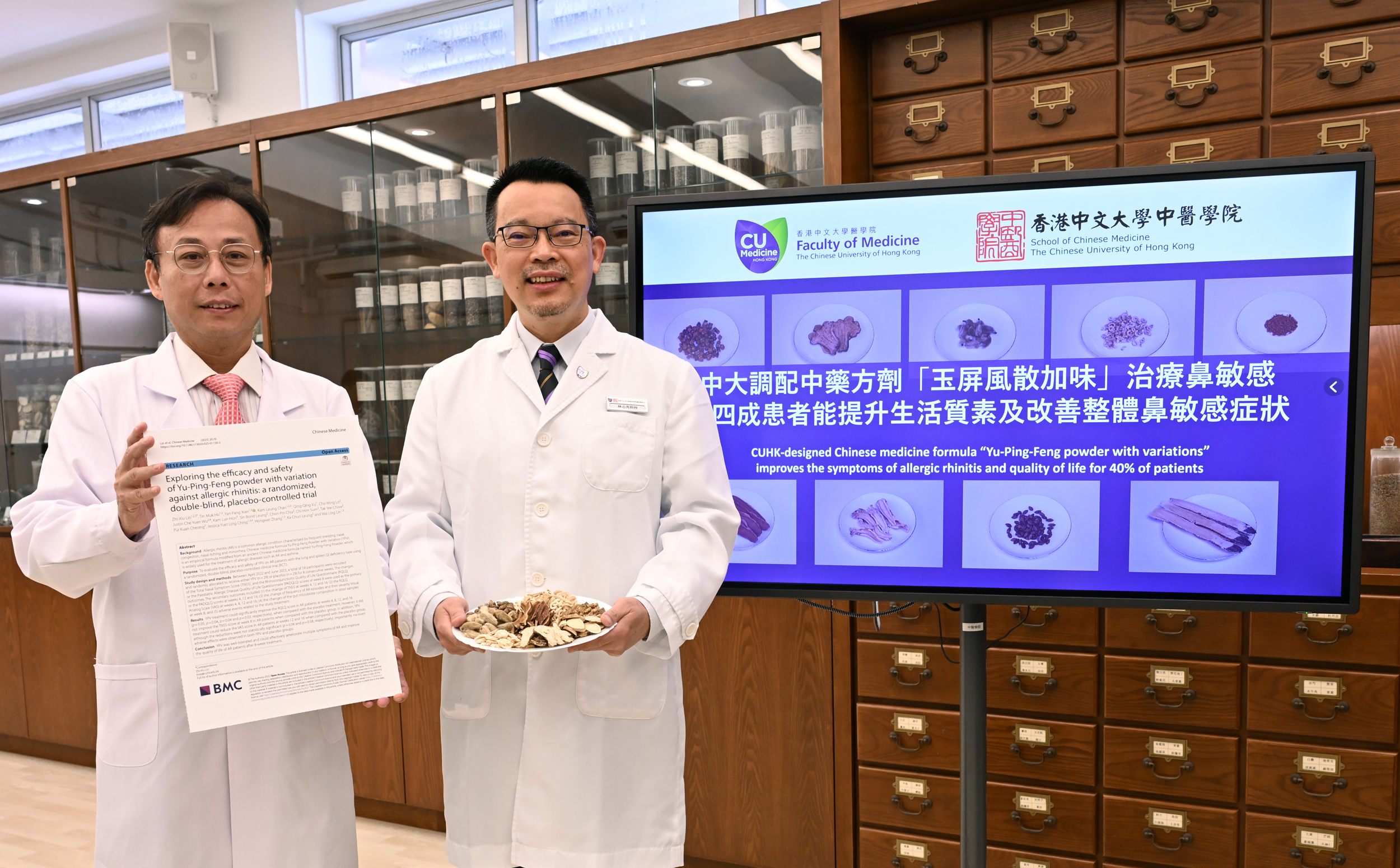CUHK-designed Chinese medicine formula “Yu-Ping-Feng powder with variations” improves the symptoms of allergic rhinitis and quality of life for 40% of patients

The School of Chinese Medicine at CU Medicine designed Chinese a medicine formula “Yu-Ping-Feng powder with variations” to treat allergic rhinitis. Results showed that after eight weeks of treatment, nearly 40% of the study participants experienced improvements in both symptoms and quality of life. In the photo are Professor Lin Zhixiu (right), Director of the School of Chinese Medicine at CU Medicine and Director of the Hong Kong Institute of Integrative Medicine and Dr Chan Kam-leung, Lecturer in the School of Chinese Medicine at CU Medicine.
Allergic rhinitis is closely related to dysfunction of lungs, spleen and kidneys
Allergic rhinitis is a common allergic condition caused by the excessive reaction of the immune system to allergens. Symptoms include frequent sneezing, stuffy nose, itchy eyes and nose, and runny nose. The allergic condition severely disturbs patients’ sleep and impacts their quality of life, affecting their performance at work and study. Since there is no cure for allergic rhinitis, patients are prone to recurrent episodes upon exposure to allergens, leading to a continuous heavy medical burden. Studies indicate that about 25% of Hong Kong’s population suffers from allergic rhinitis, with the prevalence reaching as high as 50% among schoolchildren.
Professor Lin Zhixiu, Director of the School of Chinese Medicine at CU Medicine and Director of the Hong Kong Institute of Integrative Medicine, explained: “From the perspective of traditional Chinese medicine, allergic rhinitis is closely related to the dysfunction of lungs, spleen and kidneys. If patients have weak lungs and spleen, and display symptoms such as fatigue, shortness of breath, poor appetite and loose stools, Yu-Ping-Feng powder is often prescribed to help tonify the ‘Qi’ of their lungs and spleen, and boost their immunity.”
Dr Chan Kam-leung, Lecturer in the School of Chinese Medicine at CU Medicine, said: “The CUHK-modified Yu-Ping-Feng powder with variations is composed of the dried root of Astragalus membranaceus (Fisch.) Bunge (Huangqi), the dried root of Saposhnikovia divaricate (Turcz.) Schischk (Fangfeng), the dried root of Atractylodes macrocephala Koidz. (Baizhu), the dried flowers of Magnolia denudata Desr. (Xinyihua), the dried fruit of Xanthium sibiricum Patrin ex Widder (Cangerzi), the dried fruiting bodies of Ganoderma lucidum (Leyss. ex Fr.) Karst (Chilingzhi), the dried root of Platycodon grandiflorus (Jacq.) A. DC. (Jiegeng), the dried fruit of Dictamnus dasycarpus Turcz. (Baixianpi) and the dried powder of Cordyceps sinensis (Berk.) Sacc. (Chongcaojunsifen). This formulation is suited to patients with general allergic rhinitis.”
.jpeg)
The CUHK-modified Yu-Ping-Feng powder with variations is composed of the dried root of Astragalus membranaceus (Fisch.) Bunge (Huangqi), the dried root of Saposhnikovia divaricate (Turcz.) Schischk (Fangfeng), the dried root of Atractylodes macrocephala Koidz. (Baizhu), the dried flowers of Magnolia denudata Desr. (Xinyihua), the dried fruit of Xanthium sibiricum Patrin ex Widder (Cangerzi), the dried fruiting bodies of Ganoderma lucidum (Leyss. ex Fr.) Karst (Chilingzhi), the dried root of Platycodon grandiflorus (Jacq.) A. DC. (Jiegeng), the dried fruit of Dictamnus dasycarpus Turcz. (Baixianpi) and the dried powder of Cordyceps sinensis (Berk.) Sacc. (Chongcaojunsifen). This formulation is suited to patients with general allergic rhinitis.
Nearly 40% of study participants reported significant improvement in quality of life
The research team recruited 58 patients with allergic rhinitis from April 2022 to June 2023, randomly assigning them to receive either Yu-Ping-Feng powder with variations or a placebo for eight consecutive weeks, administered twice a day. The team conducted clinical observations and questionnaires at weeks 4, 8, 12 and 16 of the study to evaluate treatment performance using the Total Nasal Symptom Score (TNSS) and the Rhinoconjunctivitis Quality of Life Questionnaire (RQLQ). The average medication adherence in both groups was close to 80%, indicating that the treatment did not have an adverse impact on participants’ daily lives.
Compared to baseline data, both groups showed improvements in TNSS scores and related nasal symptoms, including sneezing, stuffy nose, itchy nose and runny nose, with the Yu-Ping-Feng powder with variations group improving by 42% more than the placebo group. Furthermore, close to 40% of patients in the Yu-Ping-Feng powder with variations group reported significant improvements in their quality of life after four weeks of treatment, and the benefits lasted till week 16, based on their RQLQ scores.
The team conducted liver and kidney function tests for study participants before and after treatment to verify the safety of the formula, monitoring for adverse events. Results indicated that the modified Yu-Ping-Feng powder with variations group did not harm liver or kidney function, and no significant adverse response were observed in either group.
Professor Lin Zhixiu concluded: “Yu-Ping-Feng powder with variations is an effective and safe treatment option for allergic rhinitis. Patients’ quality of life and nasal symptoms improved after eight weeks of treatment. This formula not only boasted these benefits but also improved patients’ constitutions, with no rebound four to eight weeks after the treatment finished. This new Chinese medicine formula offers an innovative therapeutic approach for patients with allergic rhinitis.”








